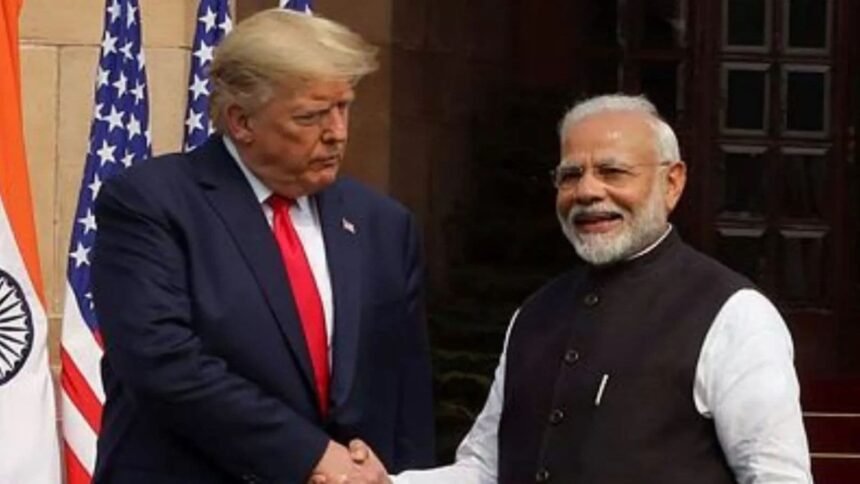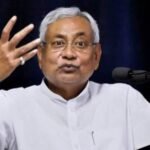As US President Donald Trump claimed Wednesday that Prime Minister Narendra Modi assured him that New Delhi would stop purchasing Russian oil, India on Thursday said that its import policies are guided entirely to safeguard the interests of the Indian consumer in a volatile energy scenario.
Without getting into the specifics of a conversation between PM Modi and the US President, the official spokesperson of the Ministry of External Affairs Randhir Jaiswal said on Thursday that India and the US are discussing increasing energy procurement from the US.
However, the MEA spokesperson did not confirm or deny that whether a conversation took place between PM Modi and President Trump on Wednesday, since Trump claimed that it took place yesterday. And neither did it address the specific claim that PM Modi had given him an assurance about stopping buying of oil from Russia.
The MEA spokesperson said, in a statement, “India is a significant importer of oil and gas. It has been our consistent priority to safeguard the interests of the Indian consumer in a volatile energy scenario. Our import policies are guided entirely by this objective.”
“Ensuring stable energy prices and secured supplies have been the twin goals of our energy policy. This includes broad-basing our energy sourcing and diversifying as appropriate to meet market conditions,” he said, reiterating India’s position since early 2022, when Russia invaded Ukraine.
“Where the US is concerned, we have for many years sought to expand our energy procurement. This has steadily progressed in the last decade. The current Administration has shown interest in deepening energy cooperation with India. Discussions are ongoing,” the spokesperson said.
Amid ongoing talks for a trade deal with India, US President Donald Trump claimed Wednesday that Prime Minister Narendra Modi assured him that New Delhi would stop purchasing Russian oil, almost two months after America imposed 25 per cent tariffs on India over those oil imports.
Story continues below this ad
Trump also said he would next try to get China to do the same, as Washington is making efforts to cut off Moscow’s energy revenues.
“This is a war that should have never started, but it’s a war that Russia should have won in the first week, and they’re going into the fourth year. And I want to see it stop,” Trump told reporters during a White House event.
“So, I was not happy that India was buying oil, and he [PM Modi] has assured me today that they will not be buying oil from Russia. You know, you can’t do it immediately. It’s a little bit of a process, but the process is going to be over with soon,” he said.
“That’s a big step. Now we’re going to get China to do the same thing,” he said, adding that pressuring Beijing would be “relatively easy compared to what we just did over the last week in the Middle East.”
Story continues below this ad
The US president was referring to the ceasefire between Israel and Hamas and the release of hostages under a peace plan brokered by him.
“If India does not buy oil, it makes it [ending the Russia-Ukraine war] easier. They have assured me that within a short period of time, they will not be buying oil from Russia, and they will go back to Russia after the war is over,” Trump said.
Modi and Trump spoke on September 16 and October 9, but the Indian side has not said that the Prime Minister assured the US president of India’s commitment to Russian oil imports.
Trump said he raised concerns with PM Modi about India’s continued imports of Russian oil, which the US sees as indirectly funding President Vladimir Putin’s war. “I was not happy that India was buying oil,” he said.
Story continues below this ad
Trump also spoke warmly of his relationship with PM Modi.
“Modi is a great man. He loves Trump,” he said, referring to himself in the third person. “I’ve watched India for years. It’s an incredible country, and every single year you’d have a new leader. My friend has been there now for a long time.”
While Trump has said India will pause buying oil until the war is over, Indian government officials have indicated that India is willing to step up energy imports from the US. Trade data released for September showed that imports from the US jumped 11 per cent while exports slipped 12 per cent.
Responding to a question on whether India could step up oil imports from the US to strike a deal, Commerce Secretary Rajesh Agrawal said Wednesday in the past seven to eight years, energy purchases from the US — largely crude oil — have fallen from $25 billion to around $12–13 billion. “So, there is headroom of around $12–15 billion, which we can purchase without worrying about the configuration of refineries,” he said.
Story continues below this ad
“There is a bilateral commitment, and in the discussions we are in, we have indicated very positively that India, as a country, would like to diversify its portfolio as far as energy imports are concerned. That’s the best strategy for a big buyer like India,” he said.
The US had imposed additional 25 per cent tariffs — taking total tariffs on Indian products to 50 per cent — on August 27. This has resulted in a 12 per cent decline in Indian exports during September.
Commerce Minister Piyush Goyal had also said last month that India is a large importer of energy and that its energy security goals will have a “very high element” of US involvement in the years to come.
India has maintained that it will continue to buy oil from Russia — currently its biggest source of crude. Oil exports are the largest source of revenue for Moscow, and New Delhi is the second-largest buyer of its oil after Beijing. But despite US rhetoric and the imposition of a 25 per cent secondary tariff, India has shown no signs of backing down on Russian oil imports.
Story continues below this ad
While July and August saw a decline in deliveries of Russian crude at Indian ports compared with earlier months, industry insiders attributed that largely to shrinking discounts on Moscow’s oil — not American pressure — as those cargoes would have been booked weeks before Trump upped the ante against India in July and announced additional tariffs on Indian goods in early August.
Russian oil deliveries from late September onwards are expected to show whether Trump’s rhetoric and tariff action have led to a reduction in oil imports from Russia. For their part, India’s public sector refiners have stated that they have not received any signal or directive from the government on the issue, and they will continue to buy Russian oil as long as it remains economically and commercially viable.








